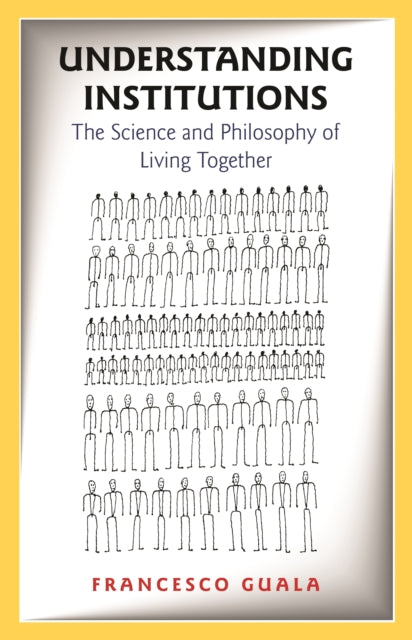Francesco Guala
Understanding Institutions: The Science and Philosophy of Living Together
Understanding Institutions: The Science and Philosophy of Living Together
YOU SAVE £4.20
- Condition: Brand new
- UK Delivery times: Usually arrives within 2 - 3 working days
- UK Shipping: Fee starts at £2.39. Subject to product weight & dimension
Bulk ordering. Want 15 or more copies? Get a personalised quote and bigger discounts. Learn more about bulk orders.
Couldn't load pickup availability
- More about Understanding Institutions: The Science and Philosophy of Living Together
Understanding Institutions is a groundbreaking new synthesis and theory of social institutions that combines the best insights of philosophers and social scientists. It proposes a unified theory of social institutions that combines the features of three influential views: as equilibria of strategic games, as regulative rules, and as constitutive rules. The book outlines and discusses various implications of the unified theory, addresses venerable issues such as reflexivity, realism, Verstehen, and fallibilism, and critically analyses the theory of looping effects and interactive kinds. It also offers new perspectives on what institutions are, how they work, and what they can do for us.
Format: Paperback / softback
Length: 256 pages
Publication date: 10 January 2023
Publisher: Princeton University Press
Understanding Institutions is a groundbreaking new synthesis and theory of social institutions that proposes a unified framework for understanding the complex dynamics of societies. Authored by Francesco Guala, this comprehensive work combines the best insights of philosophers and social scientists who have written on the topic, offering a comprehensive and integrated perspective on social institutions.
At the heart of Guala's theory is the concept of institutions as equilibria of strategic games. He argues that institutions are not merely static structures but dynamic systems that evolve over time in response to the actions and interactions of individuals and groups. Guala explains that institutions are governed by a set of rules and regulations that determine how individuals and groups interact with each other, and that these rules and regulations can be either formal or informal.
One of the key insights of Guala's theory is that institutions can be viewed as both regulative and constitutive rules. Regulative rules are those that establish the parameters within which individuals and groups can operate, while constitutive rules are those that shape the nature and identity of individuals and groups. For example, money is a regulative rule that establishes the standard for measuring the value of goods and services, while private property is a constitutive rule that defines the rights and responsibilities of individuals in relation to their possessions.
Guala's theory also addresses key institutions such as money, private property, and marriage, and develops a much-needed unification of equilibrium- and rules-based approaches. He explains how these institutions are interrelated and how they contribute to the stability and functioning of societies. For example, money is a key institution that facilitates economic transactions and promotes social cooperation, while private property is a key institution that provides individuals with the means to produce and consume goods and services.
Guala's theory is presented in a simple, clear style that is accessible to a wide audience of scholars working in different fields. He uses game theory concepts to illustrate his points, but he does so in a way that is accessible to non-experts without sacrificing the depth and complexity of his analysis. Throughout the book, Guala outlines and discusses various implications of the unified theory, addressing venerable issues such as reflexivity, realism, Verstehen, and fallibilism in the social sciences. He also critically analyses the theory of looping effects and interactive kinds defended by Ian Hacking, asking whether it is possible to draw a demarcation between social and natural science using the criteria of causal and ontological dependence.
Focusing on current debates about the definition of marriage, Guala shows how these abstract philosophical issues have important practical and political consequences. He argues that the definition of marriage is not merely a matter of personal preference but is shaped by social, cultural, and economic factors that have important implications for individuals and societies as a whole. For example, the institution of marriage has played a crucial role in shaping family structures, gender roles, and social norms, and changes to the definition of marriage can have significant impacts on these and other aspects of society.
Understanding Institutions offers new perspectives on what institutions are, how they work, and what they can do for us. By moving beyond specific cases to general models and principles, Guala provides a comprehensive framework for understanding the complex dynamics of societies and the role that institutions play in shaping our lives. This book is a valuable resource for scholars, students, and policymakers interested in social institutions, sociology, and political science. Its interdisciplinary approach and comprehensive coverage of key institutions make it an essential read for anyone seeking to gain a deeper understanding of the complex world we live in.
Weight: 342g
Dimension: 139 x 217 x 18 (mm)
ISBN-13: 9780691242354
This item can be found in:
UK and International shipping information
UK and International shipping information
UK Delivery and returns information:
- Delivery within 2 - 3 days when ordering in the UK.
- Shipping fee for UK customers from £2.39. Fully tracked shipping service available.
- Returns policy: Return within 30 days of receipt for full refund.
International deliveries:
Shulph Ink now ships to Australia, Belgium, Canada, France, Germany, Ireland, Italy, India, Luxembourg Saudi Arabia, Singapore, Spain, Netherlands, New Zealand, United Arab Emirates, United States of America.
- Delivery times: within 5 - 10 days for international orders.
- Shipping fee: charges vary for overseas orders. Only tracked services are available for most international orders. Some countries have untracked shipping options.
- Customs charges: If ordering to addresses outside the United Kingdom, you may or may not incur additional customs and duties fees during local delivery.


